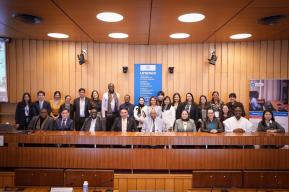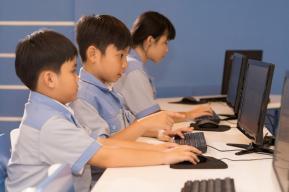News
UNESCO and Indonesia collaborate to make storybooks and math games available in 26 local languages

Following the success of the first phase of the Translate a Story campaign, UNESCO and the Global Digital Library (GDL), in cooperation with the Agency for Language Development and Cultivation (Badan Bahasa) from the Ministry of Education of Indonesia, jointly organized a translation workshop from 29 May to 2 June in the country’s capital, Jakarta. Under the guidance of trainers from UNESCO and the GDL, a group of 43 selected Indonesian translators from the Ministry, government institutions and non-government institutions translated some 250 children’s story books into Bahasa Indonesia. The translated books undergo a quality assurance process and are published on the Global Digital Library. They will become available for printing and will be imported on Badan Bahasa’s digital platform, Penjaring. Additionally, translators from the Jakarta-based regional centre for mathematics, SEAQiM, translated 29 maths games. In order to inform and improve the development of the GDL platform, user tests were conducted in 4 Indonesian schools prior to the workshop with groups of children from grade 1 to 4 (age 6 to 12).
There are 718 languages in use in Indonesia but most do not have substantial online presence apart from the national language Bahasa Indonesia. As underlined by H.E. Mr Nadiem Makarim, the Indonesian Minister of Education, Culture, Research and Technology in his opening remarks: “This programme supports our efforts at the Ministry of Education and Culture to advance local language and literature, strengthen literacy skills and improve the function of Indonesian as an international language”. In view of making more resources available in local languages, a follow up online translation workshop is planned for an additional 26 local languages, including minority and endangered languages such as Acehnese, Batak or Buginese.
Adapting content to local context
At the end of the workshop, the translators were awarded with certificates of participation by UNESCO’s Jakarta office. Reflecting on the workshop, Ms Ummy Salmah, a translator from SEAQiM who worked on the maths games, said that the workshop was interesting due to the “need to localize translation processes to be easily understood by the students. The challenge is that when the story is about western situations, including names or daily practice which some students are not familiar with, we need to adjust that information by using our local context”.
Mr Ari Sulistyo, a teacher who participated in the workshop, said he learnt a lot when translating the stories in a group because the quality of the translation is more guaranteed. He added, “as a teacher, this workshop is really good for me when translating various stories with different settings, giving me additional reference in the class when teaching. I hope there will be activities like this in the future.”
Launched with a coalition of partners during COVID-19 school closures, the Translate a Story campaign aims to make digital learning content in native languages easily and freely accessible for children. The educational resources are stored on the Global Digital Library, a web platform where high-quality early grade reading books can be accessed for reading on digital devices or for printing. Built under Norad-UNESCO partnership, the Global Digital Library has been launched jointly with UNESCO, with national launch events in Ethiopia, Cambodia, and a regional launch for Asia in Kathmandu, Nepal.
UNESCO and Norad have previously joined forces to translate storybooks, in cooperation with Ministries of Education in Bangladesh, Cambodia, Kyrgyzstan, Palestine, Qatar, Uzbekistan and Ghana to mobilize volunteers and translate books into local languages. An ad hoc campaign for out of school Ukrainian children was also launched last year, leading to the translation of 175 resources in 5 weeks. Overall, UNESCO has supported the translation of over 1,500 books into 12 languages since the start of the campaign in April 2020, with more translations planned this year.







